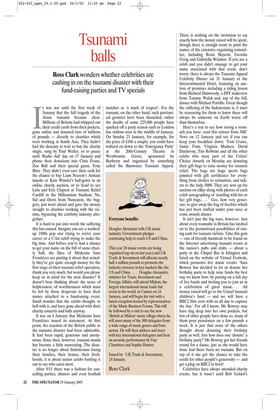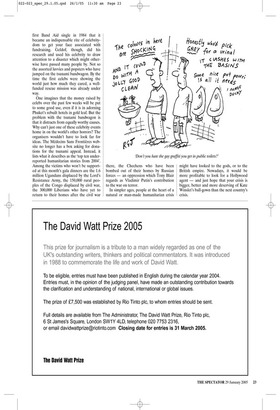Tsunami balls
Ross Clark wonders whether celebrities are cashing in on the tsunami disaster with their fund-raising parties and TV specials It was not until the first week of January that the full tragedy of the Asian tsunami became clear. Millions of Britons had whipped out their credit cards from their pockets, gone online and donated tens of millions of pounds — directly to charities which were working in South Asia. They hadn’t had the decency to wait to buy the charity single, sung by Paul Weller, or to pause until ‘Radio Aid’ day on 17 January and phone their donations into Chris Evans, Zoe Ball and their special guest, Tony Blair. They didn’t even save their cash for the chance to buy Liam Neeson’s Armani tuxedo or Kate Winslet’s ball-gown in an online charity auction, or to head to see Lulu and Eric Clapton at Tsunami Relief Cardiff in the Millennium Stadium. No, Sid and Doris from Nuneaton, the buggers, just went ahead and gave the money straight to charities working with the victims, bypassing the celebrity industry altogether.
It is hard to put into words the suffering this has caused. Imagine you are a washedup 1980s pop star trying to revive your career or a C-list celeb trying to make the big time. And before you’ve had a chance to get your name on the bill of some charity ball, the likes of Médecins Sans Frontières are putting it about that actually they’ve got quite enough money for the first stage of their tsunami relief operation, thank you very much, but would you please keep us in mind for the next disaster? It doesn’t bear thinking about: the sense of helplessness, of worthlessness which must be felt by those desperate to have their names attached to a fundraising event. Small wonder that the celebs thought, to hell with it, and have gone ahead with their charity concerts and balls anyway.
It was on 4 January that Médecins Sans Frontières issued its statement. At that point, the reaction of the British public to the tsunami disaster had been admirable. It had been rapid, generous and anonymous. Since then, however, tsunami mania has become a little nauseating. The disaster is no longer about Indonesians losing their families, their homes, their livelihoods; it is about minor celebs battling it out to see who cares most.
After 9/11 there was a fashion for cancelling parties, dinners and even football matches as ‘a mark of respect’. For the tsunami, on the other hand, such puritanical gestures have been discarded; rather the deaths of some 225,000 people have sparked off a party season such as London has seldom seen in the middle of January. On Sunday 23 January, for example, for the price of £100 a couple, you could have waltzed on down to the ‘Emergency Party’ at the 20th-Century Theatre in Westbourne Grove, sponsored by Burberry and organised by something called the Bayswater Tsunami Appeal. There is nothing on the invitation to say exactly how the money raised will be spent, though there is enough room to print the names of the extensive organising committee, including Rosie Boycott, Geordie Greig and Gabriella Windsor. If you are a celeb and you didn’t manage to get your name associated with that event, don’t worry: there is always the Tsunami Appeal Celebrity Dinner on 31 January at the Intercontinental Hotel, featuring an auction of promises including a riding lesson from Richard Dunwoody, a DIY makeover from Tommy Walsh and, top of the bill, dinner with Michael Portillo. Great though the suffering of the Indonesians is, it must be reassuring for them to know there will always be someone on Earth worse off than themselves.
Here’s a test to see how strong a stomach you have: read this extract from NBC News on 12 January and see if you can keep your breakfast down: ‘Tom Cruise, Jamie Foxx, Virginia Madsen, David Duchovny, Tim Robbins and all the other celebs who were part of the Critics’ Choice Awards on Monday are donating their gift bags to raise money for tsunami relief. The bags are huge sports bags jammed with gift certificates for everything from clothes to relaxation, and tickets to the Indy 5000. They are now up for auction on eBay along with photos of each celeb autographing or standing with his or her gift bags.... ’ Gee, how very generous: to give away the bag of freebies which has just been stuffed under your nose at some awards dinner.
It isn’t just the big stars, however. Just about every wannabe in Britain has latched on to the promotional possibilities of raising cash for tsunami victims. Take this gem — one of literally hundreds to be found on the Internet advertising tsunami events at the nation’s pubs and clubs — about a party at the Chapel Bar in Islington and listed on the website of Virtual Festivals, which promotes live music events: ‘Sara Bowrey has decided to let us donate her birthday party to help raise funds the best way we know how: by putting on a full day of live bands and inviting you to join us in a celebration of great music.... All money raised will go to the Unicef tsunami children’s fund — and we will have a BBC2 film crew with us all day to capture the fun.’ For all I know, Ms Bowrey may have dug deep into her own pockets, but lots of other people have done so, many of them poor pensioners on a few pounds a week. It is just that none of the others thought about donating their birthday party as well. Just how does one ‘donate’ a birthday party? Ms Bowrey got her friends round for a dance, just as she would have done had there been no tsunami. But on top of it she got the chance to take the credit for other people’s generosity — and get a plug on BBC2 to boot!
Celebrities have always attended charity events, but it wasn’t until Bob Geldof’s first Band Aid single in 1984 that it became an indispensable rite of celebritydom to get your face associated with fundraising. Geldof, though, did his research and used his celebrity to draw attention to a disaster which might otherwise have passed many people by. Not so the assorted luvvies and popsters who have jumped on the tsunami bandwagon. By the time the first celebs were showing the world just how much they cared, a wellfunded rescue mission was already under way.
One imagines that the money raised by celebs over the past few weeks will be put to some good use, even if it is in adorning Phuket’s rebuilt hotels in gold leaf. But the problem with the tsunami bandwagon is that it distracts from equally worthy causes. Why can’t just one of these celebrity events home in on the world’s other horrors? The organisers wouldn’t have to look far for ideas. The Médecins Sans Frontières website no longer has a box asking for donations for the tsunami appeal. Instead, it lists what it describes as the ‘top ten underreported humanitarian stories from 2004’. Among the victims who won’t be supported at this month’s gala dinners are the 1.6 million Ugandans displaced by the Lord’s Resistance Army, the 150,000 rural peoples of the Congo displaced by civil war, the 300,000 Liberians who have yet to return to their homes after the civil war there, the Chechens who have been bombed out of their homes by Russian forces — an oppression which Tony Blair regards as Vladimir Putin’s contribution to the war on terror.
In simpler ages, people at the heart of a natural or man-made humanitarian crisis might have looked to the gods, or to the British empire. Nowadays, it would be more profitable to look for a Hollywood agent — and just hope that your crisis is bigger, better and more deserving of Kate Winslet’s ball-gown than the next country’s crisis.
















































 Previous page
Previous page